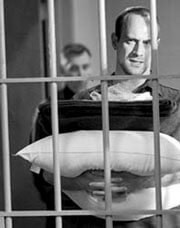Angry “100% heterosexual” prisoner loses group defamation claim
Norman Whiteside, who describes himself as “100% heterosexual,” is angry about the constant statements and implications on television that male prisoners indulge in sexual activity with each other and are thus “homosexuals.”
So he sued two television networks and two local stations, claiming that he and his fellow prisoners, are being defamed. And, oh, by the way, he demanded damages for himself of more than $150 million.
Whiteside, an inmate at London Correctional Institution in London, Ohio, filed his lawsuit in the Madison County Court of Common Pleas, representing himself. In his complaint, he listed numerous instances from recent television shows suggesting that male inmates have sex with other male inmates.
For example, he cited a television movie called “Camp Nowhere” in which one of the actors stated that “If he did not get away, he would be placed in prison with a 200-pound fiancé named Duke.” Another example he cited, from the “Steve Harvey Show,” involved Cedric the entertainer, who said, “I can’t go to jail with these boyish good looks,” to which host Steve Harvey replied, “You can be Opie here, or Shirley down in Cell Block D.”
Whiteside claimed that these broadcasts cause television viewers to believe that all prisoners, including himself, are gay, and are involved in homosexual relationships in prison. He claimed that the broadcasters “carry out their nefarious will… via psychological conditioning methods designed to condition and/or encode into the minds of all viewers to believe that all persons going to prison will be involved in a homosexual relationship.”
Without addressing the question of whether these broadcasts could be deemed discriminatory or defamatory (damaging to reputations), the trial judge ruled that Whiteside could not proceed with the law suit because he could not prove that any of the remarks on television programs were made about him.
Whiteside appealed, and the state court of appeals was not remotely interested in handling his case, approving the trial court’s dismissal on grounds that Whiteside failed to allege that any of the challenged statements were specifically about him. The court acknowledged his claim that the defendants’ actions in broadcasting this material had caused Whiteside “ridicule, humiliation, degradation, shame and diminishment in restored integrity and reputation, and emotional and mental stress.” But the court deemed all of this irrelevant and never came to terms with false statements that a person is gay might lead to liability for the speaker or writer.
American courts, unlike their European counterparts, have been very reluctant to expand liability for harmful speech to statements whose connection with the alleged victim is marginal at best. Whiteside’s attempt to claim damages for what are routine television dramas suggests an opportunistic prisoner with too much time on his hands.



































